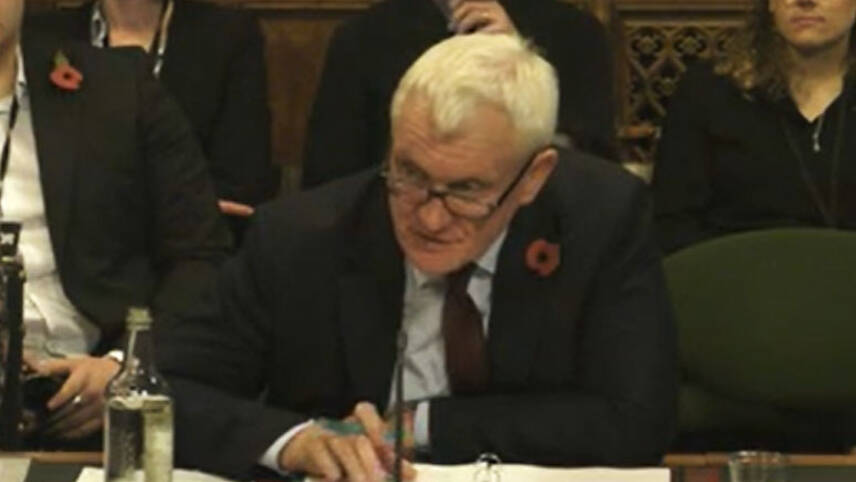Register for free and continue reading
Join our growing army of changemakers and get unlimited access to our premium content

Image: Parliament Live TV
Stuart was quizzed by MPs on the Environmental Audit Committee (EAC) on Wednesday afternoon (8 November) about his team’s preparation for the Summit in Dubai this winter.
He was asked whether, given the Conservative Government’s push for new oil and gas licenses to be awarded for the North Sea every year, the UK’s COP28 delegation would advocate for a ‘phase out’ or a ‘phase down’ of fossil fuels.
This difference in language proved to be a key sticking point at the last COP and is set to cause fierce debate this time around, too.
Stuart said: “It’s the emissions that count and, therefore, it’s the language that also counts.”
“We want to get the maximum ambition but what you’ve got to remember here is that there is nothing fundamentally wrong with oil and gas – it is the emissions from that which are the critical point.
“What we want to see the removal of is the emissions of oil and gas to the maximum extent possible.”
The United Arab Emirates (UAE) and other major oil and gas producers used this kind of rhetoric at COP27. They pushed for a text mentioning a ‘phase down of fossil fuel emissions’ rather than a phase out of the fuels themselves, paving the way for them to bypass a responsibility for a holistic energy transition if they fit enough carbon capture capacity.
UN Secretary-General Antonio Guterres has been a vocal opponent of this approach. He has previously stated: “The problem is not simply fossil fuel emissions – it is fossil fuels, period. Countries must progressively phase them out and massively boost renewable investments.”
Guterres has called an approach based on man-made carbon capture “wishful thinking” centred on “unproven technologies”.
The collective capacity of all operational carbon capture and storage (CCS) and carbon capture and utilisation (CCU) facilities in 2020 has been estimated at 38.5 million tonnes. This was less than one-thousandth of the global emissions footprint that year.
Stuart stated that the kind of language he mentioned would be needed to build consensus among as many nations as possible/
He did say that the UK would push for a “bigger immediate win” – a global end to coal expansion. The UK is primed to bring its last coal-fired power capacity offline in late 2024.
He said: “If you really care about climate change, which is a global issue, which we are [currently] less than a 1% contributor to, the last country you currently have to worry about is the UK. What we have to do is encourage others to get on a net-zero pathway as we are on. That is the focus.”
The UK does currently generate around 1% of annual global emissions but has been, historically, a significant contributor to emissions as one of the first nations to undergo an industrial revolution.
Demand-side questions
The Conservative Party has previously badged Labour’s pledge to end North Sea oil and gas expansion if elected as a threat to “turn off the tap”. Arguments were made that the opposition did not care about energy security.
Stuart used a similar line of argument speaking with England’s only Green Party MP, Caroline Lucas, today.
He stated: “The reality is that the most decarbonised major economy on earth – us – was reliant for 77% of its primary energy needs last year on oil and gas. There is no switch I can press to turn this off. We’ll be using oil and gas for decades to come. It’s the emissions we have got to focus on. We have also got to build a global coalition agreed on this.”
“I think we’ve focused too much on supply when the key driver is demand. As long as your car can’t move, your factory can’t work and your homes can’t be cooled or heated without oil and gas, someone is going to produce and sell it… The biggest challenge for us is to change the demand factors.”
Several questions were asked about Prime Minister Rishi Sunak’s recent decisions to weaken or delay policies that could reduce fossil fuel demand.
Stuart argued that other nations should not take these changes to assume that the UK is any less of a global leader on climate, because of decarbonisation to date, and because it remains committed to its 2030 and 2050 emissions goals.
Stuart stated that the Conservatives have been “very successful at creating and maintaining political support” for net-zero.
It bears noting that the UK Government’s climate advisors at the Climate Change Committee (CCC) do believe the changes made in September send mixed signals globally and could make decarbonisation in the UK in the 2030s and beyond more risky and costly.
Moreover, the CCC’s most recent comprehensive report to Parliament on the net-zero transition concluded that credible policies only exist to deliver 25% of the emissions cuts required through to 2050. This report was published before Sunak made his rollbacks.


Fossil fuels are already more expensive than renewables, and they will only become more expensive when the tax payer has to pay for carbon capture, this is a ploy by the old school.